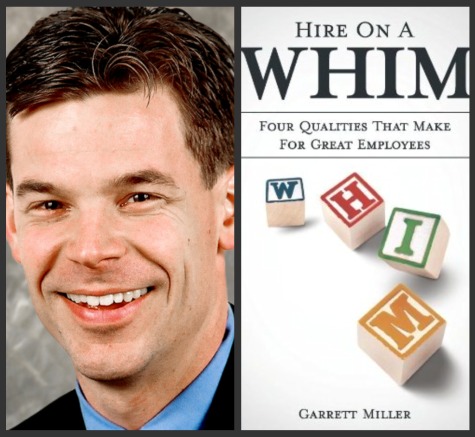On December 3, the Bureau of Labor Statistics announced that unemployment rose from 9.6% in October to 9.8% in November. As disheartening as this news is, for small and independent business owners, it signals an increase in the number of opportunities you have to expand your business. As the pool of available employees rises, so does a small company's ability to hire people who may be willing to work in exchange for a lower, yet still fair, wage.

On this week's podcast, Garrett Miller, author of Hire On a WHIM: The Four Qualities That Make for Great Employees (affiliate link) and I discussed tips to help you identify, hire, and keep the kinds of people who can help you achieve your business goals as they earn a fair wage. Garrett is president and CEO of CoTria, a productivity training company that helps corporations tackle high-impact growth challenges, including hiring and retaining talent. Here are some of Garrett's tips, combined with a few of my own based on my experiences as a former employment attorney and on experiences working with my fantastic INDIE team, including my husband and the wonderful Sophia:
Grow your cosmetics business with the world's largest selection of naturally derived and organic cosmetics bases. Visit Essential Wholesale for more information, and tell them dM sent you!
-
Assess your specific needs. There's no substitute for knowing exactly what you need in an employee. Make a list of everything you do that you want to delegate to someone else. Make sure that those tasks should be delegated, and then define the job title and responsibilities around those duties. Know how many hours you expect the person to work per week and set an hourly rate for them to be paid. The more specific you are in your job description, the easier it will be for you to weed through resumes.
-
“Listen” to the resumes. Garrett suggests quickly going through resumes to select 20 or so that you will examine more closely. To whittle it down to 20, you can easily eliminate those with things like misspellings, gaps in employment (but be careful of unfair biases), salary and goal requirements that are outside of your capabilities, etc. Once you have 20 or so in hand, set up interviews and look mainly for a good work ethic. Garrett says that to save time, you can conduct the first interviews by phone. Set up 15 or so minutes per candidate, and send an email to set up the interview. If the person seems like he or she might be worth considering more closely, set up an in person meeting.
-
Look for high levels of activity and integrity. Of course you want to hire someone who is qualified, but Garrett says that this is often secondary to hiring for high levels of activity and integrity. If someone is clearly proactive and involved in the community, they are more likely to behave similar as your employee. Integrity is key. Garrett says that, as long as basic job qualifications are met, it's better to hire integrity than ability. People can learn to perform specific tasks, but if they do not have integrity by the time you get their resume, chances are they will not suddenly get some when they work with you.
-
Engage a contractor first. If you're new to hiring, consider engaging a contractor or two before formally hiring so you can get used to leading people before investing in hiring them. (More about engaging a contractor below.)
-
Prepare for a short honeymoon. Garrett reminds us that no matter who we hire, there is always a honeymoon period followed by the reality of working with someone day in and day out. The more you hire for qualities like integrity, ethics, honesty, humility, and teachability, the easier the end-of-honeymoon period will be for you and your employee.
-
The “bad deal” rule. Like most other relationships in life, a bad employer/employee relationship rarely improves, so time spent on the front end to pick the best person possible is definitely well spent. (As you will hear in the podcast, I once hired quickly out of desperation, despite warning signs. It was not a pretty picture.)
-
Practice being “cold,” (Garrett's word) but friendly. Employees and contractors should generally not be counted in your close circle of friends. They should of course be treated with kindness and respect, but you should never tolerate slacking off or being taken advantage of. As a business leader, you must walk the tight rope between holding people accountable for work they perform in exchange for a fair wage, and genuinely caring for people's well-being and helping them grow into the best person they can be.
You should not micro-manage and hand-hold all day long, so hire self-starters who want to learn and be an asset to your business.
As you probably know, there are several federal and state laws that must be consulted and complied with in order to bring on a formal employee. Consult federal law to make sure you comply with laws to forward to the government its share of taxes you withhold, and hold in trust for the government, from your employee's pay check. Also comply with state laws dealing with withholding, unemployment security, etc.
Alternative: Engage A Contractor
How you handle those matters depends heavily on your particular state and how your business is structured via your IRS election. If the notion of dealing with all of that paperwork is a bit much for you at first, consider starting with Step 4 first and engage the services of a contractor. In a true contractor scenario, you pay the worker a specific amount of money in exchange for the performance of specific tasks. You report the money paid as a business expense and the contractor is responsible for paying his or her own taxes based on a 1099 (sample PDF) provided by you.
Another advantage of the contractor scenario for first-time hiring manager is that you don't have to pay federal minimum wage, which is $7.25. (In some states, it is higher. In California, for example, it's $8 per hour.) Contractors by definition work on their own schedule, completing tasks as assigned, but not necessarily during certain specific business hours.
Get An Accountant
There is no substitute for the advice of a good accountant when it comes to properly accounting for the financial issues associated with hiring an employee, or even a contractor. The best accountant is someone in your state who is familiar with your particular state laws. A great place to find on is your local chamber of commerce or referrals from other local small business owners.
You might also get a local payroll firm to handle all of the paperwork for you. They typically issue pay checks (usually by automatic deposit these days) and take care of withholding in exchange for a monthly or quarterly fee. They can save you a ton of time you would otherwise be pulling your hair out with all the paperwork. If there are local payroll firms in your area, check their websites for tips on handling payroll and withholding in your state. The heads of these companies may also teach classes at local community colleges, so that's another great way to get the information you need to do it right.
You Will Mess Up, And That's OK
Whatever i's you dot and t's you cross, be aware that it will never be perfect. You will make mistakes. You will make bad hiring decisions and you will mess up payroll. The thing to remember is that your business will not grow unless you have help, so educate yourself as best you can. Starting small and seeking to do the right thing from the beginning means you can make some honest mistakes and fix them as you go and grow.
About Garrett Miller
Garrett Miller is president and CEO of CoTria, a productivity training company. He graduated from the University of Rhode Island and worked for a major pharmaceutical company for 18 years, the last ten as a manager. After an award-winning career, Garrett began his latest venture as a business owner, author, keynote speaker, coach and training. CoTria's clients include some of the world's largest companies. Garrett has been married 17 years, and is a father of three. Visit Garrett's website and follow him on Twitter.
Listen to the Show
This post contains my paraphrases of the fantastic information Garrett shared. To hear it from the horse's mouth yourself, listen to the entire show, and benefit from Garrett's and my exploration of these topics first-hand. You'll get great tips that you can apply to your life and your business each and every day!
- You can download it on iTunes. (It usually takes a day or two for iTunes to feed the show there.)
- You can stream or download it at my radio show website.
- You can stay where you are and simply click on the arrow at the bottom of this post to listen right now!
- Because I have not had a chance to load all of my shows to this blog, you can listen to hundreds of interviews from 2005 to 2010, each one as relevant today as it was when I recorded it, at my Indie Business Radio site.
Coming Up Next Week!
Coming up on December 13 at 1:00pm EST, my guest, Gigi Stetler, author of Unstoppable: Surviving Is Just the Beginning
(affiliate link) and the sole woman owner of two RV dealerships, will share insider tips on how she overcame a near death experience to triumph in the RV business world, filled with mainly with men.
Join me and Gigi at 1:00 on December 13 at this link.
See you then!
Question: What tips do you have for small companies looking to hire their first employee?



